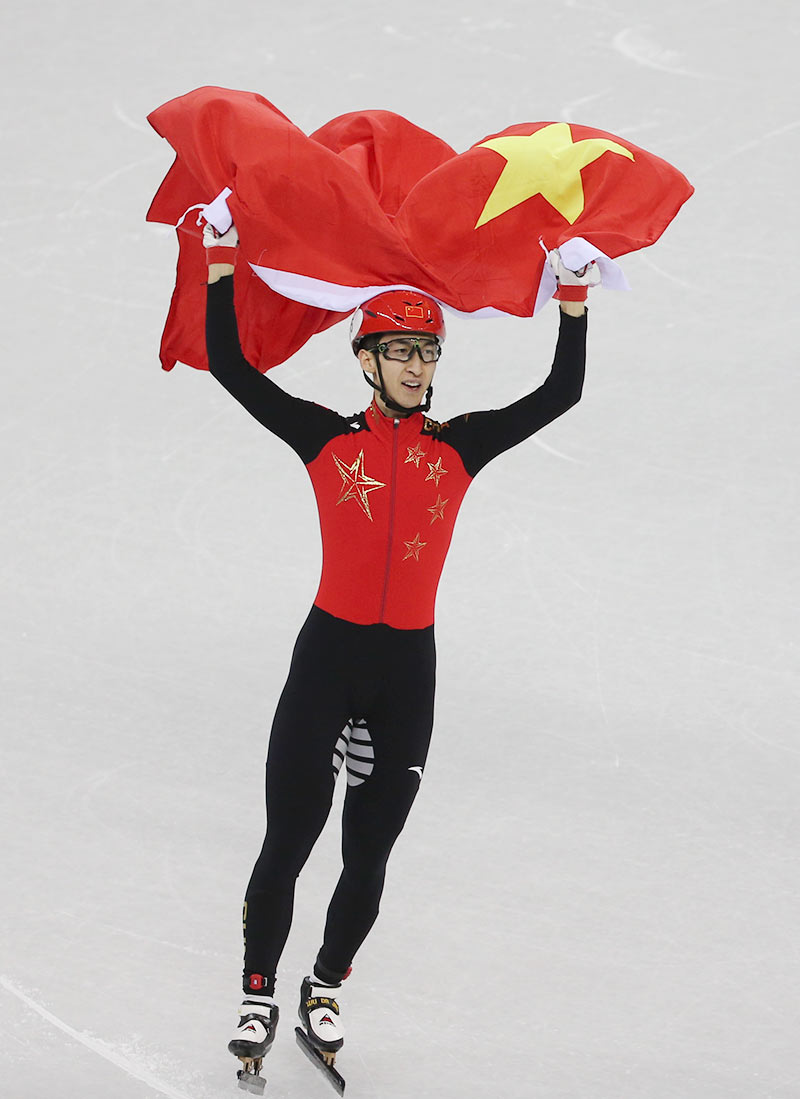Four-year quest starts now
 0 Comment(s)
0 Comment(s) Print
Print E-mail China Daily, February 28, 2018
E-mail China Daily, February 28, 2018

Despite its gold medal shortage in Pyeongchang, Team China returned from the Winter Olympics determined to achieve a more balanced showing at the 2022 Beijing Games.
Winning one gold in Pyeongchang, its thinnest gold haul at Winter Olympics since 2002, Team China, which finished 16th overall, can take solace in the fact those medals were won in five different events-the nation's most diversified outcome since debuting at the Winter Olympics in 1980.
"The medal results reflected our country's current level in winter sports objectively," said Gao Zhidan, deputy director of the General Administration of Sport of China and deputy chef de mission of China's Pyeongchang delegation.
"Finishing with just one gold was lower than our expectation, but we shall embrace the fact that we are well behind world powers in winter sports and we shall work harder to close the gap."
Having won nine of China's 12 Winter Olympic gold medals before Pyeongchang, the national short-track speed skating team was hit with multiple disqualifications in its stronger events-the women's 500m, 3,000m relay and men's 1,000m-due to controversial penalty calls.
The improved level of European rivals such as Hungary and the Netherlands has made the short-track competition fiercer than the former one-on-one battle between China and archrival South Korea.
Men's sprinting specialist Wu Dajing's world-record win in the 500m, China's first men's Olympic gold on the short track and the country's only gold in Pyeongchang, ended the team's subpar campaign on a high note, together with the silver medal won in the men's 5,000m relay on the last day of the short-track competition.
China's women's team, once a dominating force in the event, failed to win a gold for the first time since 2002 but was bolstered by young talent such as 17-year-old Li Jinyu, who withstood challenges from senior rivals to win silver in the 1,500m.
"We pulled through a stressful journey in Pyeongchang with disappointments as well as some positive gains," said Li Yan, head coach of the short-track team.
"I am proud of my athletes for their determination and composure facing difficulties and even unfair treatments. I don't consider our performance as the worst ever, as the medal number might suggest. But we do have a lot to do to improve to prove ourselves again in 2022."
Among the 50 penalties called on the short track in Pyeongchang, China and Canada tied for the most with nine each, while the host South Korean team was only called three times.
China's world-class prowess in figure skating pairs and freestyle skiing aerials also failed to convert to gold after world champion pair Han Cong and Sui Wenjing, veteran aerial skiers Zhang Xin and Jia Zongyang all finished second with razorthin deficits of less than a point in their respective events.
"We relied so much on a very limited range of strength events in winter sports, and once we couldn't perform well in these specific events we finished with a thin gold haul," said Gao.
"To realize the ultimate goal for a balanced and excellent campaign at the 2022 Games in Beijing, we have to invest more in our relatively weak events to expand our strength to as many sports as possible while trying to maintain the advantage in our current strong events."
China's first Olympic silver medal in snowboarding, won by Liu Jiayu in women's halfpipe, expanded the country's Olympic medal sources from four events to five. And the first medal in men's long-track speed skating, a bronze won by Gao Tingyu in the men's 500m, was another encouraging sign of more podium finishes in 2022.
Chinese athletes debuted in 10 events, including men's bobsled and skeleton, women's ski jumping and freestyle skiing moguls, making progress toward the country's goal of qualifying for 102 events in Beijing.
"We still have to keep a positive mindset going forward with these breakthroughs fueling our ambition as a driving force," said Gao.
"If we allocate resources in the right place and make up for our weakness in a smart way, we can expect a successful home Olympics in 2022."






Go to Forum >>0 Comment(s)